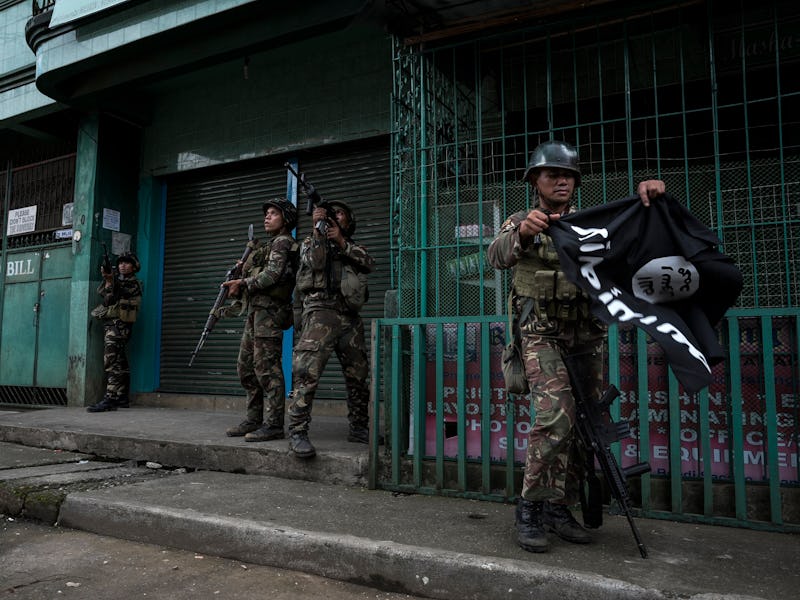The 5 Biggest Revelations About U.S. Cybersecurity Failings
Trump leaked crucial intelligence to the Russians and Philippines.

The New York Times published a deft expose Monday into America’s ongoing cyberwarfare battles against its enemies. The article relates the various cyberattacks by the United States against Iran, North Korea, and, most notably, ISIS. The piece delves into a couple of gaffes by President Donald Trump in which he shared classified intelligence with Russia’s foreign minister and the president of the Philippines. Attempts to destabilize ISIS through the internet have been largely unsuccessful and the president’s leaking only problematizes the situation further.
Here are the five biggest revelations that emerge from the Times story, which reports how in the wake of a terrorist bombing in Manchester, England and another attack in London, America’s ability to intercept terrorist communication hasn’t been good enough.
5. ISIS is becoming “more adept at turning the web into a weapon.”
The Pentagon’s main interest in cyberwarfare is to use the internet to disrupt the Islamic State’s ability to recruit, use encrypted communications, and spread propaganda, by manipulating their data and freezing their computers. Yet, communications and recruitment tactics can be quickly reconfigured and, as the recent attacks in Iran and Britain illustrates, ISIS is deft at using social media, encrypted software, and anonymous messaging applications like Telegram as a weapon.
4. Trump bragged about sensitive intel with Rodrigo Duterte.
He boasted of how America was able to disrupt North Korea’s antagonistic missile program, which lead to a series of failed launches. Recent evidence suggests, however, that by using a different kind of missile, the North has “overcome at least some of the problems.” Sharing this information with Duterte, the president of the Philippines, is suspect as he’s accused of running a brutal regime in his country and has previously slandered America, calling President Barack Obama a “son of a whore” and to “go to hell.”
3. Trump shared classified intelligence with the Russians.
The information which came from the Israelis — about how ISIS was designing bombs to look like laptop batteries — was part of the sensitive intelligence that the president is accused of sharing with the Russian foreign minister, Sergey V. Lavrov, and the ambassador to the United States, Sergey I. Kislyak in a closed-door meeting in the Oval Office last month. Trump’s supposed boasting of classified intelligence, in turn, “infuriated Israeli officials.” To quote James Comey, “Lordy, I hope there are tapes.
2. Israeli discovered that ISIS was disguising bombs as laptop batteries.
Despite the Pentagon’s struggles to combat ISIS via the Internet, a rare success was achieved by Israeli cyberoperators, who infiltrated the bomb-makers’ outfit. As allies, the Israelis shared the intel with the U.S. and this helped prompt the ban last March on large electronic devices in carry-on luggage on flights to America and Britain from 10 airports in eight Muslim-majority. According to the Times, “the terrorist group was working to make explosives that fooled airport X-ray machines and other screening by looking exactly like batteries for laptop computers.”
1. “The results have been a consistent disappointment.”
Using cyberwarfare to fight ISIS “is just much harder in practice than people think,” said Joshua Geltzer a senior director at the counterterrorism at the National Security Council. These shortcomings, exacerbated by Trump’s penchant to boast and neglect subtlety, illustrates America’s growing challenges in crippling the “Islamic State in cyberspace.”
It’s not clear that Trump’s babbling of highly sensitive counterterrorism intelligence will put us on the brink of Worl War III. It does, however, strain American-Israeli relations, lead us further into a confusing quagmire with the Russians and Philippines, and, well, makes the exploding Samsung phones look like firecrackers.